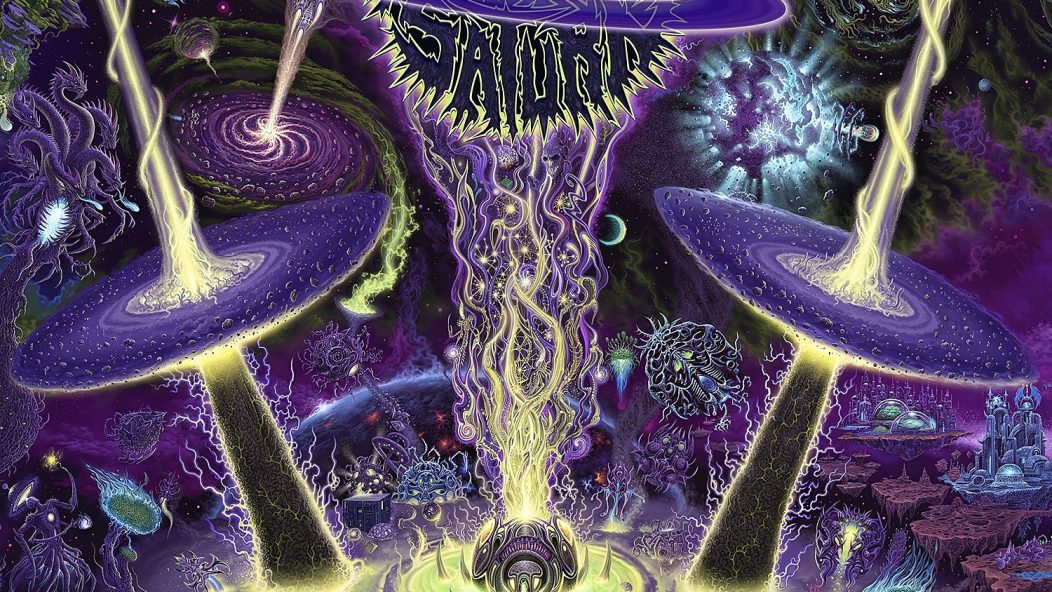
Not (Really) Deathcore: Rings of Saturn's "Ultu Ulla"

…
We’re writing about Ultu Ulla more than a month after its release for a three reasons: life’s incessant hecticness, the blinding shitstorm of Rings of Saturn-related press, and the time it takes to fully absorb this exceedingly frustrating album. What follows is a take on deathcore through an Ultu Ulla lens, mostly because the album says more than it actually contains. That’s not to say that Ultu Ulla is vapid or vacuumed (more on that later), but that Rings of Saturn had actually been granted a real/rare opportunity to reshape the subgenre altogether. Credit where credit is due: they took a valiant stab at a giant and wicked beast.
Bottom line: Ultu Ulla is okay, but deathcore is special because you can appeal to the subgenre’s connoisseurs by just being better than Suicide Silence or Emmure. This is a function, aesthetically, of deathcore’s inherent single-mindedness: slam, slam, slam, slam, slam. Innovating deathcore without abandoning its foundations requires centering the slam artistically, bolstering it with the surrounding music. Bands who aim to do more than just slam typically draw their influences from technical death metal. This makes sense, given the obvious crossovers, and Rings of Saturn throughout their discography have been this far at least.
…
https://www.youtube.com/watch?v=Dmu3zjmkJZ0
…
Ultu Ulla is fast, it’s furious; it has innumerable breakdowns, it has bonkers sweep picking, i.e. it checks off all the boxes across its ten manic tracks. It’s good enough, then, for deathcore fans who really want a freshly complex type of deathcore that nobody is writing, but can settle for slammy tech-death. They’re used to it, anyway: plenty of tech-death bands already dabble with deathcore-esque slams, like Shadows of Intent, without copping the subgenre. The talent gap and desperate ears exist on deathcore’s end: the slam must always be worshipped above all else. Deathcore does have somewhere definitive to go, and a cut-and-paste job from another subgenre isn’t going to cut it.
Bottom bottom line: Ultu Ulla is an okay deathcore album because it’s a pretty great tech-death album. Simply tracing over tech-death tropes instead of creatively reimagining them can only take you so far, however. Aside from all the box-checking, the album sees the transformation of the slam into tech-death componentry: removing it as subject, replacing it as object. This is fine, in context, but keep in mind that all prior Rings of Saturn records have had this at their heart: how to make slams (and breakdowns, for that matter) as interestingly ridiculous and ridiculously interesting as possible. The same doesn’t go for Ultu Ulla. The breakdowns are faster than they are heavy, they come expectedly instead of unexpectedly, and melodic considerations now outweigh displays of blatant, raw aggression. Rings of Saturn have pulled closer to the likes of Inanimate Existence and Archspire (both of which are solid tech-death bands).
It’s okay, really. Some people get their kicks reading dense instruction manuals, or assembling incredibly minute replicas of ancient buildings in pickle jars with tweezers. Fastidiousness suits them; perhaps they work in business, like accounting. Ultu Ulla is the perfectly-formatted spreadsheet: musical information organized perfectly, as if a machine (or human corporate slave) had prepared it. But there’s nothing absurd about it, i.e. nobody has inserted “penis” somewhere in small font. The album has a bewildering architectural beauty to it for sure, but also an unnerving coldness, as if smiling and fun were alien concepts. Basically, Rings of Saturn got serious.
…
…
This process started, to some extent, on Lugal Ki En (it even has a Rusty Cooley solo), but there artificiality was leveraged for aesthetic impact instead of being the sterile byproduct of intense complexity as with Ultu Ulla. The whole “morally indifferent super-powerful killer outer space beings” shtick really came through for Rings of Saturn on their last album. Lugal Ki En balanced its sterility with all the bonkers, brand-name Rings of Saturn spasmodic energy that they’ve since corked. (Just compare the Ultu Ulla-era music video at the beginning of this article with the Lugal Ki En-era one above this paragraph).
Rings of Saturn indeed took flak in the past for their ironic/idiotic (read: smug) attitude — but we can’t assume they gave a shit; this shift in intensity on Ultu Ulla was intentionally artistic (a clear attempt), not reactionary. They never wavered in the face of negative press, and it’d be a stretch to assume that they’ve ever half-assed anything. Rings of Saturn truly sought real deathcore in tech-death, but found nothing; in an experiment, a negative result is still a result. It’s just a shame they didn’t approach or design it differently, i.e. carried on with the outlandishness and unkempt fury of Lugal Ki En.
A damn shame, actually, because truly excellent deathcore exists out there but gets no recognition. One shining example is Echoes of Misanthropy (who are recording a new album now) and their Shades of Ugliness EP (check it out below this paragraph). It’s 12 minutes of textbook how-to on making slamming interesting without relying so heavily on tech-death material. They certainly know how to noodle and shred, but in doing so never lose target of the end deathcore goal: to slam so goddamn heavy that the universe breaks. Indeed, the EP’s tracks are resolutely deathcore songs, albeit heavily decorated; the point is that they’re not tech-death songs which happen to have deathcore slams. As far as Rings of Saturn goes, Lugal Ki En has more in tune with Echoes of Misanthropy than Ultu Ulla does, and that says something about how the band has changed (or evolved, depending on your point of view).
…
…
Different strokes, for sure, but there are two camps of deathcore revolutionaries here. One says “fuck deathcore” because it’s inherently vapid, all scene and no content, and basically uninteresting — so they turn to tech-death for hope (e.g. Job for a Cowboy on Genesis). The other camp recognizes the heap of deathcore garbage, hates it, but loves the genre for its honest potential — so they seek purity and innovation within deathcore itself, limiting outside influence as much as possible. The point is that Rings of Saturn seem to have changed sides with Ultu Ulla, for better or for worse. While not exactly the bullet in deathcore’s back, it won’t be inspiring deathcore innovators from within. It looks like deathcore shall be shaped from without.
There are bands like NovaThrone, who in 2015 released Revenants as a symphonic, atmospheric take on actual deathcore. Tracks like the penultimate ”Hollow Sea” flirt with progressive and tech-death influences, but the structure is always this: build up to a grand slam, hit the heaviest climax, and include bass-drops for extra effect. NovaThrone do get arguably close to ripping off Rings of Saturn (pre-Lugal Ki En, anyway), but think of it like this: a son can emulate his father. This is to say that without (early) Rings of Saturn, we wouldn’t have bands like NovaThrone, or even Echoes of Misanthropy. Undoubtedly, each Rings of Saturn album — up to Ultu Ulla, that is — has been essential deathcore listening.
Ultu Ulla is an important album for sure, and from a narrow perspective a worthy one, but it doesn’t bring any of its found sustenance back to “deathcore home.” Embryonic Anomaly (2010), Dingir (2013), and Lugal Ki En (2014) all delivered stylishly hyperbolic deathcore that few others were able to nail down at the time. These no-shits-given albums made Rings of Saturn mega popular, especially Lugal Ki En. While there’s no necessary connection between fame and the departure from one’s artistic foundations, it does happen. What that means for the subgenre when one of its defining bands evolves significantly is yet to be known. Whether “deathcore home” and the traditions which live there wither and die may not actually matter anymore; things change, and people deal. But if it actually does matter, someone else might have to save it.
Who, though?
…
Ultu Ulla was released on July 28th on Nuclear Blast. Stream the album via Spotify below.
…
…










